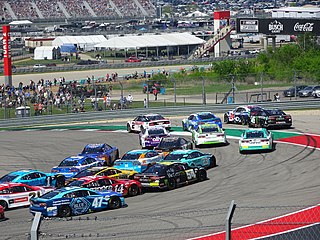
Auto racing is a motorsport involving the racing of automobiles for competition. In North America, the term is commonly used to describe all forms of automobile sport including non-racing disciplines.
Motorcycle sport is a broad field that encompasses all sporting aspects of motorcycling. The disciplines are not all races or timed-speed events, as several disciplines test a competitor's various riding skills.
The Sports Car Club of America (SCCA) is a non-profit American automobile club and sanctioning body supporting Autocross, Rallycross, HPDE, Time Trial, Road Racing, and Hill Climbs in the United States. Formed in 1944, it runs many programs for both amateur and professional racers.
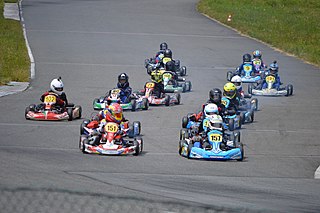
Kart racing or karting is a motorsport discipline using open-wheel, four-wheeled vehicles known as go-karts or shifter karts. They are usually raced on scaled-down circuits, although some professional kart races are also held on full-size motorsport circuits. Karting is commonly perceived as the stepping stone to the higher ranks of motorsports, with most Formula One drivers—including Ayrton Senna, Michael Schumacher, Fernando Alonso, Kimi Räikkönen, Lewis Hamilton, Sebastian Vettel, Nico Rosberg, and Max Verstappen—having begun their careers in karting.
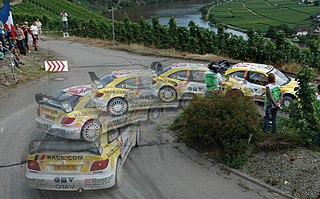
The handbrake turn is a driving technique used to deliberately slide a car sideways, either for the purpose of quickly negotiating a very tight bend, or for turning around well within the vehicle's own turning diameter.
Motorsport(s) or motor sport(s) are sporting events, competitions and related activities that primarily involve the use of automobiles, motorcycles, motorboats and powered aircraft. For each of these vehicle types, the more specific terms automobile sport, motorcycle sport, power boating and air sports may be used commonly, or officially by organisers and governing bodies.

Autocross is a form of motorsport in which competitors are timed to complete a short course using automobiles on a dirt or grass surface, excepting where sealed surfaces are used in United States. Rules vary according to the governing or sanctioning body, such as the length of the course, the amount of permitted attempts, or whether competitors start the course individually at intervals or at the same time as others. In this latter form, Autocross differs from other forms of motor racing by using a system of heats or alternative timing methods for the classification rather than racing for position and declaring the first across the finish line as the winner.

The Trans-Am Series presented by Pirelli is a sports car racing series held in North America. Founded in 1966, it is sanctioned by the Sports Car Club of America (SCCA). Primarily based in the United States, the series competes on a variety of track types including road courses and street circuits. Trans-Am is split into the TA and TA2 classes for silhouette racing cars, while its production classes are the GT, SGT, and XGT.
Motorkhana is a low-cost form of motorsport, unique to Australia and New Zealand but similar to autotesting in the UK and Ireland and gymkhana in the US. It involves manoeuvring a car through tight tests as quickly as possible - one car at a time - on either dirt or bitumen surfaces. This usually requires sliding and spinning the car accurately while maintaining speed through the test course. Some reversing is usually included.
The International Motor Sports Association (IMSA) is a North American sports car racing sanctioning body based in Daytona Beach, Florida, under the jurisdiction of the ACCUS arm of the FIA. It was started by John Bishop, a former executive director of SCCA, and his wife Peggy in 1969 with help from Bill France Sr. of NASCAR. Beginning in 2014, IMSA is the sanctioning body of the WeatherTech SportsCar Championship, the premier series resulting from the merger of Grand-Am Road Racing and the American Le Mans Series. IMSA is owned by NASCAR, as a division of the company.
Dirt track racing is a form of motorsport held on clay or dirt surfaced oval race tracks often used for thoroughbred horse racing. Dirt track racing started in the United States before World War I and became widespread during the 1920s and 1930s using both automobiles and motorcycles. Two different types of race cars dominate — open wheel racers in the Northeast and West and stock cars in the Midwest and South. While open wheel race cars are purpose-built racing vehicles, stock cars can be either purpose-built race cars or street vehicles that have been modified to varying degrees. There are hundreds of local and regional racetracks throughout the nation. The sport is also popular in Australia, New Zealand, Canada, South Africa and the United Kingdom.

The GT World Challenge America is a North American auto racing series launched in 1990 by the Sports Car Club of America. It has been managed by the Stéphane Ratel Organisation since 2018, and has been sanctioned by the United States Auto Club since 2017.
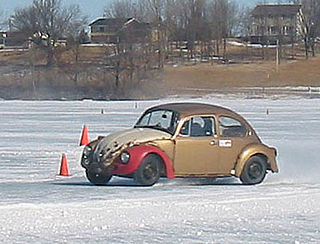
Ice racing is a form of racing that uses cars, motorcycles, snowmobiles, all-terrain vehicles, or other motorized vehicles. Ice racing takes place on frozen lakes or rivers, or on groomed frozen lots. As cold weather is a requirement for natural ice, it is usually found at higher latitudes in Canada, the northern United States, and in northern Europe, although limited indoor events are held in warmer climates, typically on ice hockey rinks. Tracks in North America vary from 1/4 mile to several mile-long circuits.

Autotesting involves a series of tests, generally around traffic cones, to measure precision driving skill.
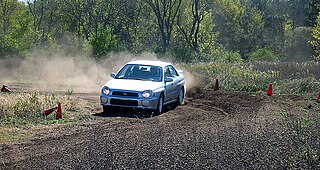
RallyCross, also known as RallyX, is a type of car competition in the United States and Canada, sanctioned by Sports Car Club of America (SCCA). It is a timed event that involves solo driving on grass or dirt and can be considered "autocross on the dirt." As with autocross, the emphasis is on driver skill and handling rather than absolute speed, with frequent corners generally keeping speeds below 60 mph (100 km/h). In many ways RallyCross is to rally racing as autocross is to road racing.

Spec Racer Ford is a class of racing car used in Sports Car Club of America (SCCA) and other series road racing events. The Spec Racer Ford, manufactured and marketed by SCCA Enterprises, is a high performance, closed wheel, open cockpit, purpose-built race car intended for paved road courses, such as WeatherTech Raceway Laguna Seca, Buttonwillow Raceway Park, Road America, Watkins Glen, and many other tracks throughout North America. With more than 1,000 cars manufactured, it is the most successful purpose built road racing car in the United States.

Gymkhana is a type of motorsport, known as Motorkhana in Australia and New Zealand and as Autotesting in the United Kingdom and Ireland. Similar to autocross, the goal of gymkhana is to achieve the fastest time possible; memorizing the course is a significant part of achieving a fast time. The name is loaned from the equestrian discipline of gymkhana.
The following is a glossary of terminology used in motorsport, along with explanations of their meanings.

AutoSolo in the United Kingdom is a form of motorsport based around the principles of autotesting, with the main differences being that the tests are run in a forward direction only and are usually slightly faster and more open than traditional autotests. Courses are usually larger than those for autotesting, and as the courses are laid out to run in one direction, it is common for more than one car to be on the course at the same time.

Autoslalom is a form of motorsport that takes place on short, temporary courses marked out on areas of sealed-surfaces such as car parks or disused airport runways. Competitors are timed to complete the course, with penalties given for diverting from the route or for touching the course markers. Each competitor starts individually and speeds are kept low to emphasise safety and to require good vehicle control.













